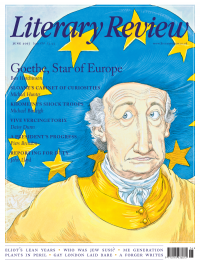Andrew Gallix
Read All About It
Barthes: A Biography
By Tiphaine Samoyault (Translated by Andrew Brown)
Polity Press 586pp £25
At first blush, the author of ‘The Death of the Author’ may seem a somewhat paradoxical choice of subject for a biographer. Au contraire, argues Tiphaine Samoyault in Barthes: A Biography, originally published in France in 2015. Just shy of five hundred pages long, excluding notes and index, it is, to date, the most comprehensive portrait of Barthes’s life and times. Calling it definitive – which in many respects it is – would be to miss the point, however. Memories being open to constant recomposition, Barthes felt that lives should not be written in stone. He hoped his own might be limited to a few ‘biographemes’ – ‘a few details, a few preferences, a few inflections’ – which, ‘like Epicurean atoms’, would perhaps touch ‘some future body, destined to the same dispersion’. The ideal biography would thus come in the form of a book in a box, like something by Marc Saporta or B S Johnson, the unbound pages of which could be shuffled around like the index cards Barthes wrote on. The stand-alone paragraphs of his own memoir, Roland Barthes by Roland Barthes (1975), were arranged in alphabetical order so as to obviate narrative continuity and its attendant teleological bias. While cleaving to a traditional, broadly chronological format, Samoyault goes to great lengths to ensure that Barthes does not end up pickled in aspic. In a prologue, she retraces his last steps on the day in 1980 when he was knocked over by a van, an accident that led to his demise (from pulmonary complications) one month later. ‘The Death of Barthes’ is, in effect, cordoned off, lest his life be reduced, retrospectively, to a fixed, univocal reading, akin to the ‘“message” of the Author-God’ he had once lambasted.
Barthes regarded death as the only event that truly eludes language. All the rest is discourse, as he argued in Mythologies (1957), a book in which he took reading out of the library and into the world. Rather than drawing up a laundry list of the different hats he wore,

Sign Up to our newsletter
Receive free articles, highlights from the archive, news, details of prizes, and much more.@Lit_Review
Follow Literary Review on Twitter
Twitter Feed
It wasn’t until 1825 that Pepys’s diary became available for the first time. How it was eventually decrypted and published is a story of subterfuge and duplicity.
Kate Loveman tells the tale.
Kate Loveman - Publishing Pepys
Kate Loveman: Publishing Pepys
literaryreview.co.uk
Arthur Christopher Benson was a pillar of the Edwardian establishment. He was supremely well connected. As his newly published diaries reveal, he was also riotously indiscreet.
Piers Brendon compares Benson’s journals to others from the 20th century.
Piers Brendon - Land of Dopes & Tories
Piers Brendon: Land of Dopes & Tories - The Benson Diaries: Selections from the Diary of Arthur Christopher Benson by Eamon Duffy & Ronald Hyam (edd)
literaryreview.co.uk
Of the siblings Gwen and Augustus John, it is Augustus who has commanded most attention from collectors and connoisseurs.
Was he really the finer artist, asks Tanya Harrod, or is it time Gwen emerged from her brother’s shadow?
Tanya Harrod - Cut from the Same Canvas
Tanya Harrod: Cut from the Same Canvas - Artists, Siblings, Visionaries: The Lives and Loves of Gwen and Augustus John by Judith Mackrell
literaryreview.co.uk